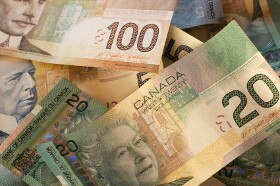The Canadian dollar started on Friday holding a three-month high as inflation data boosted odds of the central bank raising interest rates. Those gains were later pared after a White House official stated that the US is âvery, very closeâ to moving ahead on a trade deal without Canada, suggesting that the U.S. and Mexico will embark upon a bilateral agreement instead of a trilateral one.
According to Statistics Canada, the national annual inflation rate declined to 2.8% in August, from 3% in July. This is the seventh straight month that the inflation numbers have exceeded the Bank of Canada (BOC)âs 2% target rate. Also, all of the BOCâs core inflation figures were higher than 2% for the first time in nearly seven years.
Since July 2017, Ottawa has raised rates four times, and the market is penciling in another rate hike in October.
In other economic numbers, retail trade advanced 0.3% in July.
Speaking in an interview with Fox News on Friday, Kevin Hassett, chairman of the White Houseâs Council of Economic Advisers, revealed that the US and Mexico are getting ready to go it alone on a new trade pact, leaving Canada sitting on the sidelines. Hassett warned that an updated North American Free Trade Agreement (NAFTA) deal might result in a bilateral situation instead of a trilateral agreement.
We’re still talking to Canada. We’re getting very, very close to the deadline where we’re going to have to move ahead with Mexico all by themselves. I’m a little surprised that the Canadians haven’t signed up yet. They’ve got a really, really good deal that they should be participating in.
Trade negotiators have set October 1 as the deadline to reach a conclusion. Mexico wants to have a deal in place before the new president-elect is sworn into office, while Washington is demanding a new deal before the midterm elections in November.
Most experts agree that Canada has the most to lose if a renegotiated NAFTA is not done. Because Canada sends roughly 75% of its exports to the US and maintains a current account deficit, the economy would potentially contract.
The loonie did find support from rising energy prices as November West Texas Intermediate (WTI) crude oil futures tacked on $0.58, or 0.82%, to $70.90 per barrel on the New York Mercantile Exchange.
The USD/CAD currency pair rose 0.12% to 1.2920, from an opening of 1.2904, at 16:56 GMT on Friday. The EUR/CAD fell 0.2% to 1.5164, from an opening of 1.5196.
If you have any questions, comments or opinions regarding the Canadian Dollar,
feel free to post them using the commentary form below.
